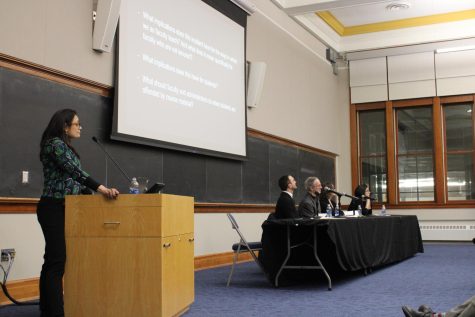Letters: American Association of University Professors (AAUP), Hamline Chapter
January 16, 2023
Statement From Hamline AAUP Faculty on Academic Freedom and Responsibility
Hamline faculty affirm both academic freedom and our responsibility to foster an inclusive learning community. Importantly, these values neither contradict nor supersede each other.
Classroom teaching should promote an environment respectful of all learners. However, this does not mean that instructors should shy away from subject matter that challenges students’ beliefs. On the contrary, the central purpose of a liberal arts education is to encourage students to examine ideas from multiple perspectives.
To preserve the vibrant environment for open inquiry and free exchange of ideas that Hamline values, we also affirm the primacy of faculty discretion to choose how classes are taught, free from interference by Administration. Such administrative respect for faculty judgment is essential to faculty being able to continue to provide innovative and challenging student learning opportunities, consistent with Hamline’s long history.
We deeply regret that a colleague was unjustly accused of being “undeniably inconsiderate, disrespectful and Islamophobic” in a fall semester class. We reject this divisive public statement that has exacerbated the incident, and we call on the Administration to do the same.
We are dismayed that some of the Administration’s responses to student complaints about the teaching of images that offended them—rather than encouraging broad, respectful dialogue about complex issues—were instead guided by decisions that have mired our campus in controversy. We support students’ rights to express their concerns and complaints, and to have them taken seriously. However, some of the ways those concerns were handled in this case have amplified the challenges we now face as educators who are committed to our students’ intellectual growth and their personal well-being. We condemn the hateful speech and threats targeting students and other Hamline community members.
As faculty we will continue to provide the kind of rigorous and socially engaged learning experiences that Hamline is deservedly known for. For us to do that, the Administration must recognize the faculty’s perspective on academic freedom, which respects religious or other differences, and which is also unwaveringly committed to the university’s role in encouraging students to think broadly, think critically, to explore intellectually and to learn from others. That is a commitment we—and other Hamline constituencies—are still waiting to hear from administrative and academic leaders.
Stephen R. Arnott
President, AAUP Hamline Chapter





AtheosThinker • Jan 18, 2023 at 7:26 am
Kudos for standing up this letter to the editor. Indeed, knowledge should be them gem not the poison.